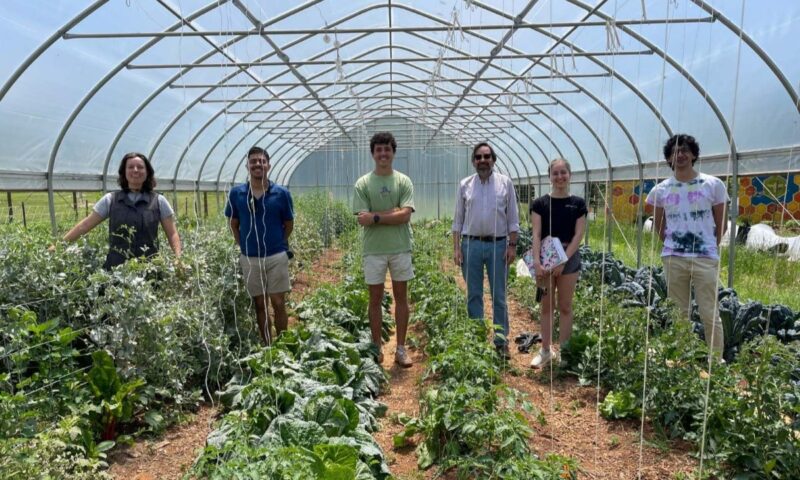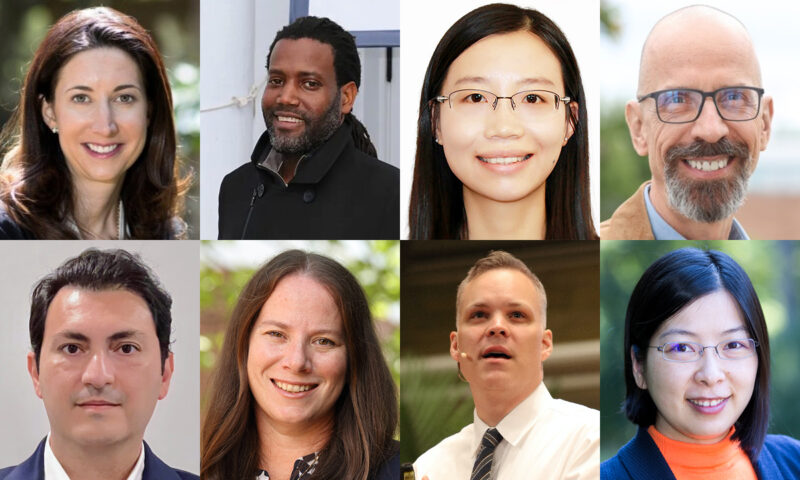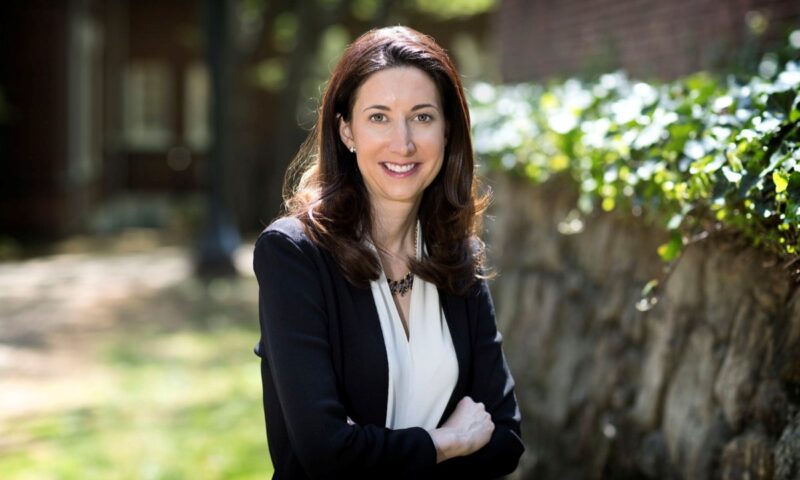Back in 1975, William G. Shenkir may have seemed an improbable candidate to assume the highest leadership position at the Commerce School, considering that after joining McIntire in 1967 and teaching until 1973, he took a leave of absence to work at the nascent Financial Accounting Standards Board, initially as a technical adviser to a board member—a choice that would eventually result in Shenkir resigning his tenured professorship in order to stay at the FASB.
“And then I got a call from Frank Hereford in ’77,” he says, referencing a fateful conversation with the then-University of Virginia President (1974-1985).
Hereford invited Shenkir to interview to be Dean of the Commerce School, a role previously held by Frank S. Kaulback Jr. for 21 years.
But when the opportunity was offered to him, Shenkir’s return to Grounds was not a foregone conclusion. He and his wife, Missy, had already made substantial changes in their lives, and the prospect of returning to Charlottesville would take some careful consideration.
As fate would have it, they chose to come back. Shenkir served as McIntire Dean for 15 years, overseeing a multitude of important changes that included developing the School’s incomparable student experience; strengthening and expanding its faculty; expanding Monroe Hall; creating a second graduate program in MIS; forming the McIntire School of Commerce Advisory Board; and creating the financial and IT foundation that ushered in an era of innovation that has come to define the Commerce School and raise McIntire’s profile as a national leader in business education.
The Road to McIntire
For Shenkir, who was born and raised in Texas, the path to Grounds was as unexpected as it was indirect. As an undergraduate business administration student at Texas A&M University, he was in the Air Force ROTC program and knew that he would be commissioned a Second Lieutenant and go on active duty upon graduation in 1960. Though he completed his undergraduate coursework during the Vietnam War, he received a delay to his service for educational purposes, allowing him to earn both his MBA in 1962 and PhD in 1964 from The University of Texas at Austin.
Those academic achievements were followed by three years of active duty in the U.S. Air Force as a First Lieutenant.
“I was stationed in the Washington, D.C., area, and I had a great assignment with the U.S. Air Force Auditor General,” he says. It was around that time that he began to consider his future and weighing potential landing places to embark on his academic career.
Being less than three hours from Washington, the CPA found his way to UVA, and accepted an offer to join the Commerce School as an Assistant Professor in Accounting in 1967. “It is very likely that without that military assignment, I would never have found UVA as a place to begin my academic career,” he says.
The appointment, one of a slew of new faculty positions, was part of a greater expansion taking place across Grounds; his arrival coincided with that of other would-be longtime McIntire professors such as fellow hire Whit Broome, a current Professor Emeritus.
“The University was growing, and thus, the Commerce School was growing,” he says. “It got started at McIntire back when Dean Frank Kaulback received several positions and brought in a new group of faculty, all of whom were eager to pursue their teaching, do well at it, and look at creative ways to do it.”
He explains that, having earned his PhD before serving in the military, he was able to find a part-time teaching position in the evening MBA program at American University while on active duty. As a result of his experience, Shenkir was promoted to Associate Professor with tenure at the Commerce School after two years, which was followed by another promotion to full Professor three years after that, in 1972.
But what took place in the spring 1973 could very well have permanently ended his association with McIntire.
An Unexpected Opportunity
Interested in accounting scholarship, Shenkir pursued a research grant that he received from the University, as the Commerce School didn’t yet have a research grant program in place. That spring, he recalls, Price Waterhouse Partner Donald Kirk, an FASB member he had met several years earlier while a Faculty Fellow with the firm, reached out to him to be his technical adviser.
The FASB, a policymaking group in the private sector, Shenkir says, was created “to set the accounting standards that public companies have to follow when they report to their shareholders.”
After interviewing with the Board, he returned the grant back to the University, and decided to take a two-year leave of absence to take on the challenge of being a technical adviser and later a project director with the FASB.
“At the end of that two years, I had to make a decision. Do I come back to UVA? I was heavily engaged in what we were doing up there, my wife was working on her MBA, and we loved where we were living in Wilton, CT,” he says. “We decided I would resign my professorship.”
During that stage of his FASB career, Shenkir often found himself on the go. His work with the FASB required some travel, taking him to speak with Accounting professors at colleges and universities across the country. “Some of those turned into a mini-recruiting trip: ‘When you get out of your work there, think about us as a place to teach,’” he recalls.
But upon completing a section of the project he was engaged in at the FASB in 1976, he felt the pull to return to teaching. He reentered the academic profession at the Graduate School of Business at NYU as a Visiting Professor of Accounting.
It was around that time that the aforementioned call came from UVA President Hereford, who was calling with an invitation to interview: “‘Bill, I’d like you to come down and talk about becoming the Dean of the Commerce School.’”
Shenkir remembers his surprise when he arrived on Grounds, unexpectedly finding that McIntire had switched buildings in the over four years that he was gone. “When I left on my leave, the Commerce School was in Rouss Hall—and when I came back to interview, they were in Monroe Hall.”
Though the School had called Monroe Hall home from 1930 to 1955, it had changed addresses for Rouss Hall, where it stayed from 1955 to 1975. It had returned to Monroe for a second stint when Shenkir came back—and where it would stay until after his tenure as Dean.
Shenkir received the offer to be McIntire’s Dean. He and his wife discussed it, and decided that the institution and the position were too highly regarded to turn down. “We were here before, and it was a good opportunity. We decided to come back.”
Succeeding Kaulback, the Commerce School’s first Dean, Shenkir was appointed its second, and also named the Paul G. McIntire Professor of Commerce on July 1, 1977.
An Active Approach
There was much to be done. But Shenkir saw the exigencies as opportunities.
“It was a great time to become Dean in a school that was in dire need of better physical facilities, endowed professorships, student scholarships, money for faculty research—you name it,” he says freely. “The needs were a long list. For 15 years, with the able assistance of the faculty and alumni, we tried to chip away at that.”
His first order of business that August was to interview every faculty member in order to hear and understand all of their concerns. That lengthy exercise was followed by an all-faculty conference focused on strategic planning. The results of those meetings would eventually yield some important changes, including the creation of the School’s own Commerce Career Services, which began by converting a faculty position to that of the director of this new office.
“The ground had been set with a faculty initiative, and then we set up our own office. And that was a key point, because we really took care of the whole student—not just in the classroom—but the exit strategy for the student from the University.”
Another goal Shenkir met, and one he is perhaps most proud of, was prioritizing the establishment of numerous endowed professorships and research.
He says McIntire had three professorships when he began his tenure as Dean, but by the time he stepped down, the School boasted 20. The process for securing them began with partnering with the large accounting firms that had heavily recruited from McIntire, and continued with contacting successful graduates, alumni who endowed positions in memory of their friends and classmates, and corporations.
“To build a faculty long term, you’re going to need that support. If you’re going to build capabilities for your students to have the best exit strategy from your program, you’re going to need that career planning and placement office. Those two things, I think, certainly outlive me. And since then, much had been added to both of those. But we had to get started.”
Tech Steps and Tight Spaces
Shenkir points out that the market for business faculty was in flux during his tenure as Dean. Business schools were growing across the country, precipitating a competitive race for talent—one that meant research had to be prioritized. This push translated to the Dean’s office being responsible for raising funds to build the intellectual capital of the faculty through research and the necessary organizational components to bolster it.
“It takes computers, all the databases faculty need, good secretarial support, and opportunities to travel to participate in conferences to present your research. There’s got to be a whole buildup—and it doesn’t happen overnight—to build that infrastructure. It takes resources.” he says.
To offer a snapshot of where the School was technologically at that point, his thoughts go to the situation surrounding the phone. “If you wanted to make a long-distance call in Monroe Hall, you had to go down the hallway and use this little cubicle,” he says, thinking back to the sole means of communicating with the outside world from McIntire. “But again, we were very resource limited,” he concedes.
Yet the digital revolution was dawning at that point in the mid-1980s. Shenkir remembers reading an article from Harvard declaring it the “Year of the Computer” in business education. Reading the writing on the wall, he ensured that as Apple rolled out its first personal computers, McIntire acquired enough of them to house its first student computer lab. Despite it being cutting edge, it was replaced shortly thereafter by an IBM PC lab, and the Macintoshes were donated to the School of Education.
“We had to do that with private funds, and it was good that we had developed private funds to do that,” he says, explaining how pervasive technology was becoming. “Obviously, early in business education, you put a faculty member in the classroom with chalk and eraser, and they could go at it. Now, it became much more capital intensive, with every faculty member needing a computer in their office, and computer labs for students. And so that was a marked change.”
Another advancement impacted the home of the Commerce School. Monroe Hall was at maximum capacity.
“We were bulging at the seams,” says Shenkir. Rectifying the problem necessitated some good PR to attract funding, but since the University was launching its first capital campaign, it was already in the process of seeking the attention of alumni from all Schools across Grounds. He smartly thought to capitalize on that outreach to steal some of the spotlight for McIntire’s most urgent needs.
Addressing the overpopulation issue began by installing trailers near Monroe Hall to give students additional group study and case work space; they also provided some much-needed faculty offices—and highlighted the School’s growing pains. “By putting those trailers there, that raised visibility with the central administration that we had to be pretty high priority to get an addition to Monroe Hall. We worked on that for 10 years,” he says.
When they set out to physically enlarge the building in earnest, the project had to be delayed for an entire year, as they had issues with the original hired architectural firm.
“We came back a year later with Hartman-Cox, which has since designed other buildings at UVA. But they did a great job to make that building look like it’s always been there,” he says of the addition that was dedicated in 1987 and now houses the College of Arts & Sciences’ Economics department.
A Commerce Career and Advice for McIntire’s Future Ambitions
Shenkir’s contributions to the Commerce School as Dean were integral to many of the advancements that were later introduced at McIntire. But when his third term as Dean ended in 1992, he was a mainstay in the Accounting area, where he continued teaching for 15 years, through the fall of 2006.
Shenkir also maintained a lifelong involvement with the accounting profession, contributing to numerous committees at the national level, while remaining dedicated to improving business education. He served on the board of directors and as President of the American Assembly of Collegiate Schools of Business and as Vice President of the American Accounting Association, and was a member of the Accounting Education Change Commission. In the corporate sector, he was on the board of directors of Dominion Bankshares and the First Union Virginia board, and served for 15 years on the ComSonics board. In the nonprofit area, he recently completed nine years on the University Physicians Group board, and devoted his time to roles on the local nonprofit boards of ReadyKids, City of Promise, and the Charlottesville Committee on Foreign Relations. (He served as chair of the latter two boards.)
But it was his time leading McIntire and teaching at the Commerce School that seems to have defined a great deal of his life’s work.
“I became associated when I was 29 years old as Assistant Professor. I’m 83, so that’s over 50 years of my life right here in Charlottesville. I think you can pick out things that have made the School distinctive,” he says, pointing specifically to the launching of the McIntire Business Institute to meet the needs of the market and create connections across Grounds.
He recalls a particularly significant conversation with Dexter Whitehead, Dean of the Graduate School of Arts & Sciences from 1969 to 1989.
“They were producing more PhDs in social sciences than there were available academic positions for them. We suggested, ‘We will design a program—Career Opportunities for PhDs in the Humanities and Social Sciences—to take that intellectual capital and offer PhDs a program so that they can transfer their knowledge and capabilities to seek a position in business.’ The six-week program continued for eight years and enabled many PhDs to launch successful careers in the business world. And then we created the McIntire Business Institute, and that helped many Arts & Sciences undergraduate students to get much better career opportunities,” he says. “You’ve got to find ways for everyone who leaves this University to find their place in the world beyond the University walls.”
Shenkir’s care for the future of his students was a boon to those who came to learn at McIntire, and caused a virtuous cycle to begin that continues today.
“Alumni went back to their companies and said, ‘We’ve got to recruit McIntire students,’” he says, crediting the graduates with maintaining a tradition of taking care of current Comm students. “There seems to be a reservoir of positive comments about being a student at UVA. And then, as alumni, the respect they have for their experiences stays with them. It worked out well for us in my 15 years as Dean. I spent a lot of time doing it, enjoyed it, and never met an alumnus who wasn’t proud of or happy about having been an alumnus of the University of Virginia. And that means you take care of people here, and they’re going to take care of the School later. It’s a win-win situation.”
Because of the collective talent within the Commerce School, McIntire still holds “great leverage for the rest of the University to get familiar with business,” he says, acknowledging the School’s plans for designing additional interdisciplinary pan-University programs, such as its minors in Leadership, Entrepreneurship, and Real Estate. “That’s something,” he says, “sort of blowing the walls out of the individual disciplines and reaching out to other areas in the University.”
He believes that brand of vision and intent is crucial to the School’s ongoing success.
“We’re going to be blessed with a great source of students into the future; you just have to find creative ways to take care of them. And I think the McIntire School does that,” he says. “There’s a lot of opportunity to use that creative talent to keep the future going. You’ve got to always be thinking, ‘What’s the next thing around the corner that could be a possibility? And can we take our competence and intellectual capital and work with them to enable them to do a more productive job in what they’re doing?’”
If McIntire is as capable as many—Shenkir included—believe, the potential for good is exponential. “The whole society benefits if we can do that.”



